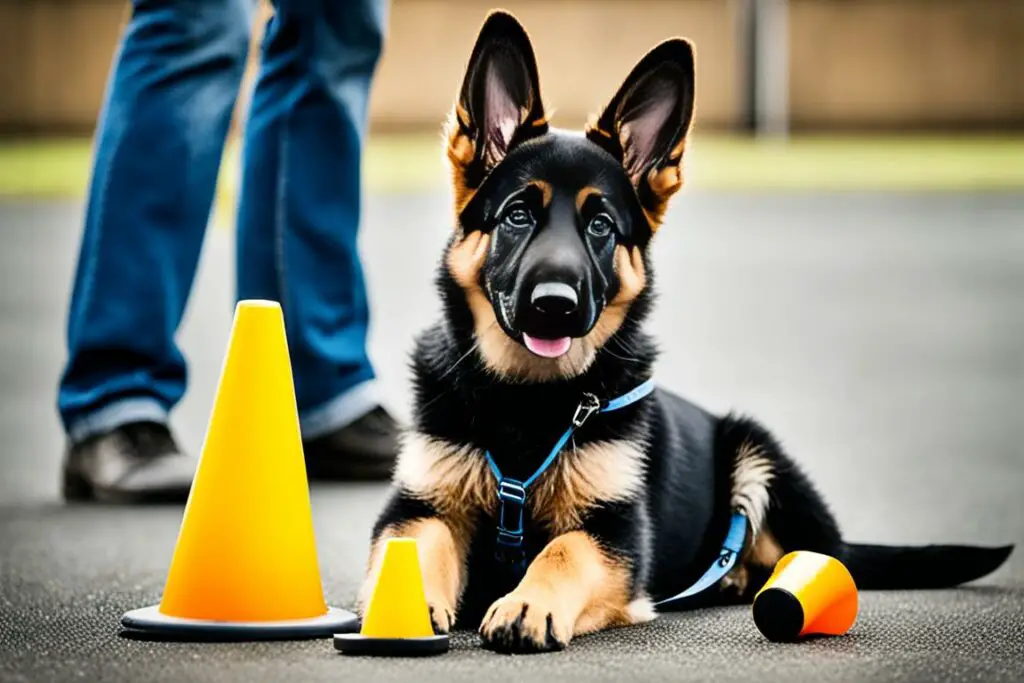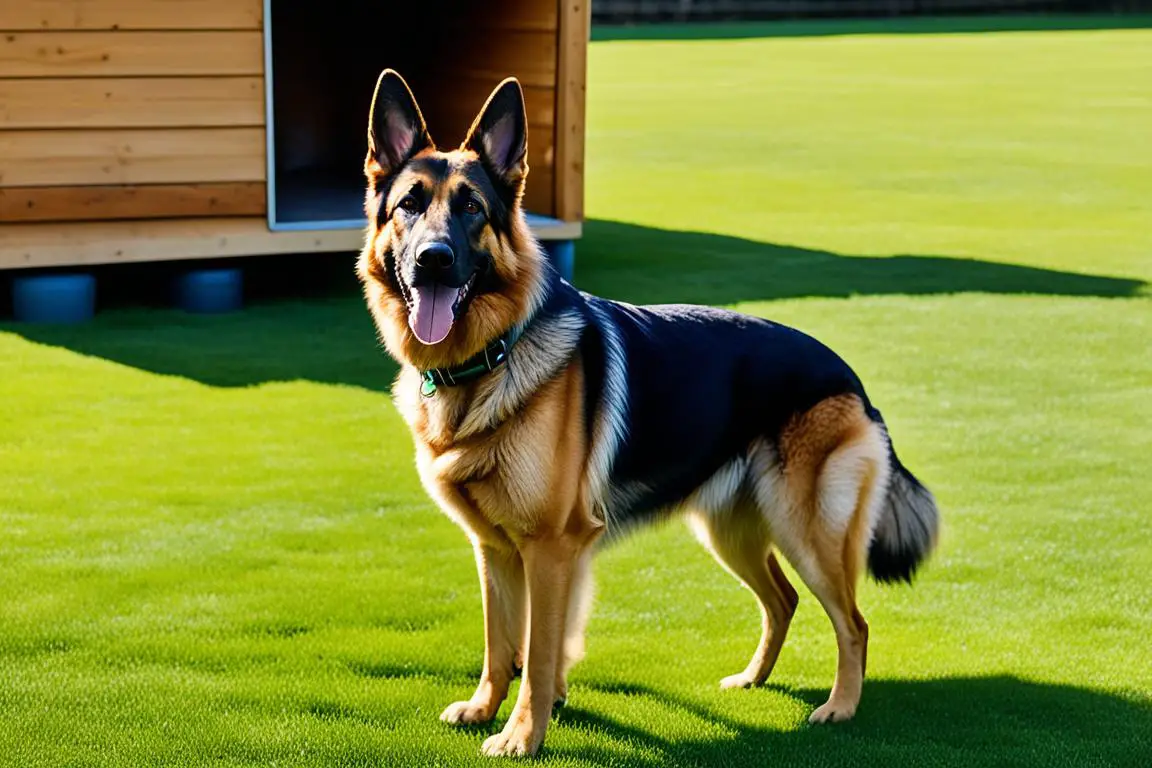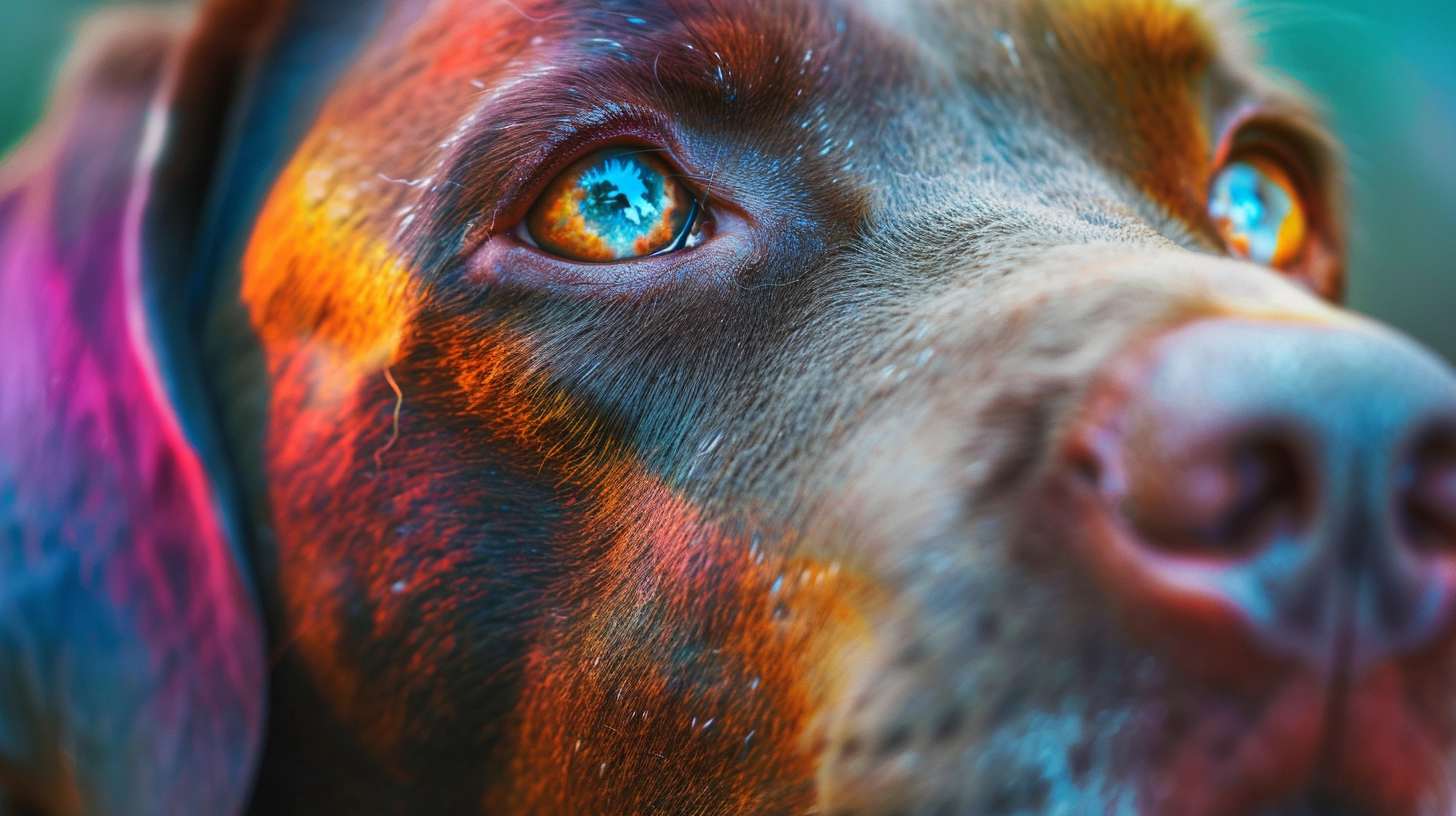Did you know German Shepherds are not just loyal but also smart? These dogs have a long history. They’ve served as guardians and worked with police and the military. When you get a German Shepherd, knowing their needs is key. It’s essential to give them the right care and training.
Key Takeaways:
- German Shepherds are loyal companions and intelligent canines.
- They have a rich history and have served in various roles.
- Proper care and training are crucial for their well-being.
- German Shepherds thrive when provided with mental and physical stimulation.
- Stay tuned to learn more about German Shepherd care and training tips in this comprehensive guide.
The German Shepherd Breed Profile
German Shepherds are known for their smarts and athleticism. They are famous due to movies and various jobs. Rin Tin Tin, a famous German Shepherd, became a hero in the 1920s for his courage.
These dogs were first bred in Germany in the 1800s for herding. Their herding skills made them quick and strong. Nowadays, they’re still great at herding but also serve as police and search dogs.
Renowned for their intelligence, German Shepherds learn quickly. They’re among the smartest dogs, easily learning new commands. They’re also in tune with their owner’s feelings and can understand human body language well.
German Shepherds are medium to large, standing 22 to 26 inches tall. They weigh between 50 and 90 pounds. Their strong build and stamina make them perfect for tough tasks.
German Shepherds are loyal and protect their families. This loyalty, combined with their ability to perform various tasks, makes them great working dogs and family pets.
Key Characteristics of German Shepherds:
- Intelligent and quick to learn
- Sensitive to their owners’ emotions
- Medium to large size, with an athletic build
- Excellent herding abilities
- Well-suited for roles as police dogs, search and rescue dogs, and service dogs
German Shepherds are recognized not only as faithful pets but also as hardworking dogs. Their intelligence, strength, and loyalty are greatly admired.
The Qualities of a German Shepherd Owner
Owning a German Shepherd is a rewarding experience. It requires a dedicated and confident owner. These intelligent dogs are known for their loyalty. They make great companions for people and families. It’s important for owners to have qualities that meet the breed’s needs.
Confidence is important for owning a German Shepherd. They are protective and need an owner who is confident. By being a strong leader, you create trust and respect. This is key for a great relationship with your dog.
German Shepherds need mental and physical activity. They love companionship and exercise. Walks, playtime, and training keep them happy and sharp.
German Shepherds are very loyal and bond with their families. They want to feel part of the family. Spending time together is key to a strong bond with your dog.
German Shepherds are not for first-time or hesitant owners. They need clear training and boundaries. New owners should get experience with the breed before getting their own dog.
While some prefer purebreds, mixed-breed German Shepherds are also great. They have many of the same qualities with a less intense nature. They can be wonderful for families wanting a German Shepherd.
Tips for Being a Successful German Shepherd Owner:
- Exude confidence and establish yourself as a strong leader
- Provide consistent mental stimulation and physical exercise
- Spend quality time with your German Shepherd to foster a strong bond
- Commit to ongoing training and provide clear boundaries
- Consider volunteering or spending time with the breed before adopting
- Don’t overlook the potential of mixed-breed German Shepherds
By having these qualities and following these tips, you’ll have a great experience as a German Shepherd owner. These wonderful dogs will be loyal companions for years. With the right care, they offer so much to their owners.
The History of the German Shepherd Breed
The German Shepherd breed has an interesting story that started in 1889. Max von Stephanitz, a German cavalry officer, found a wolf-like dog with great herding skills. He bought this intelligent dog and named him Horand von Grafrath.
Von Stephanitz saw a lot of potential in Horand. So, he started the first German Shepherd club to create a versatile working breed. He worked hard to improve their loyalty, smarts, and strength. In 1899, Horand became the first official German Shepherd Dog.
But, the breed had some hard times during World War I due to anti-German feelings. They were called Alsatians in English-speaking places to avoid the German connection. Even with these issues, they proved to be excellent war dogs on the battlefield.
“The greatest praise that could be bestowed upon them was the fact that some soldiers have declared, if German Shepherds were withdrawn from the front, they would refuse to go forward.”
German Shepherds also became stars outside of war. Rin Tin Tin, a Hollywood hero, made the breed famous. He became a well-known name and helped many people love German Shepherds.
Today, German Shepherds are loved for being loyal, smart, and flexible. They’ve gone from humble starts to being Hollywood stars. German Shepherds have won the love of many as loyal friends, hard workers, and valued family members.
Healthy Lifestyles for German Shepherds
German Shepherds thrive when they feel like part of the family. Showing them love and proper care is crucial for their happiness. This makes them joyful and healthy.
Training is vital in making sure your German Shepherd behaves well and feels confident. Start training early, focusing on obedience and good behavior. Using rewards and being consistent helps a lot.
Socialization during their puppy years is key for their growth. It helps them get along with others and prevents future behavior problems. Introducing them to new places and faces is important.
German Shepherds are smart and need mental challenges. Games, puzzles, and toys keep their minds active. Regular training sessions also keep them sharp and build on their skills.
These dogs need lots of physical activities too. They love being active. Walking, jogging, or playing games daily is essential. Activities like herding or agility training are perfect for them.
“A happy and healthy German Shepherd is a well-trained dog that receives ample mental stimulation and physical exercise. Investing time and effort into their care and training will reward you with a loyal and loving companion.” – German Shepherd enthusiast

| German Shepherd Care Tips | Key Considerations |
|---|---|
| Provide a nutritious diet | Choose high-quality, breed-specific dog food to support their health and energy needs. |
| Maintain regular vet check-ups | Schedule routine veterinary visits for vaccinations, preventive care, and health monitoring. |
| Keep up with grooming | Regular brushing helps manage their dense coat and promotes healthy skin. |
| Create a safe and comfortable home environment | Provide a secure yard and a designated indoor space where they can rest and feel at ease. |
| Pay attention to dental care | Regular teeth brushing and dental hygiene practices reduce the risk of dental problems. |
To make sure your German Shepherd is healthy and happy, pay attention to their needs. Provide a loving home, train and socialize them well, and keep them active. This will ensure they live a fulfilling life.
Finding the Right German Shepherd Puppy
When searching for a German Shepherd puppy, find a reputable breeder or adopt from rescues. This ensures you get a puppy from a trusted source. You also support responsible breeding.
An ethical breeder matches the right puppy with the right person or family. They look at the puppy’s personality to find the best fit. It’s important to think about the puppy’s temperament to ensure it matches your lifestyle.
Breed rescue organizations are great for finding a German Shepherd puppy in need. They specialize in rescuing and finding new homes for these dogs. They help you find a puppy that fits your needs and tell you about its background.
When picking a German Shepherd puppy, consider how trainable they are. These dogs are very smart and learn quickly. This makes them great for different types of training. Training with them is rewarding for both you and the puppy.
Remember, finding the right German Shepherd puppy is about what feels right for you. Take your time looking into breeders or rescue groups. Ask many questions and think about the puppy’s personality and how trainable it is. This way, you bring a great German Shepherd puppy into your home.
| Benefits of Finding the Right German Shepherd Puppy |
|---|
| 1. Well-bred and Healthy: Getting a puppy from a good breeder or a rescue means you get a healthy, well-cared-for pup. |
| 2. Temperament Match: Choosing a puppy based on its temperament ensures it fits well with your life and preferences. |
| 3. Training Potential: German Shepherds are easy to train. A well-bred puppy is likely to do well in obedience and other tasks. |
| 4. Supporting Responsible Breeding: Opting for an ethical breeder or adopting from a rescue helps fight overbreeding and puppy mills. |
“Finding the right German Shepherd puppy is a personal journey. Take your time to research breeders or rescue organizations, ask questions, and carefully consider your puppy’s temperament and training potential.”
Training Goals for German Shepherd Puppies
Training your German Shepherd puppy is fun and rewarding. It needs constancy and patience. Set clear goals and use the right training methods. This way, your puppy will grow up to be a behaved and sure adult dog.
Socialization:
In your puppy’s early weeks, make sure to socialize them. Introduce them to various people, animals, and places. Exposing them to new situations early helps them be relaxed and sure, no matter where they are.
Crate Training:
Crate training is key for house training and making a safe space. Start slow with the crate, making it a happy place. A crate is like a den to them, a place to feel safe. Use treats and praise to make them like the crate.
Obedience Training:
Start teaching basic commands like sit, stay, and come early on. Use rewards and kind words to encourage good behavior. Begin with short training times and slowly do more. Being consistent and repeating lessons are important for obedience training.
Teach your puppy to follow commands early. Use rewards and kind words for good behavior. Short training sessions work best at first. Remember, consistency is key.
Recall Training:
Teaching your puppy to come when called is very important. Use treats and praise to make it fun for them. Begin training where there are no distractions and slowly add more. Be patient and stay consistent to get them to come every time.
Impulse Control:
German Shepherds are smart and full of energy. Teaching them to control their urges improves their behavior. Commands like “leave it” teach them self-control. Exercises that require them to wait are good for learning patience.
Engaging in Mental and Physical Activities:
German Shepherds need both mental and physical exercise. Try puzzle toys and games to challenge their mind. Also, give them physical activity like walks or fetch. A busy dog is a good dog.

Keep these training goals in mind to help your German Shepherd puppy grow up well. Have patience, be consistent, and always be positive. Enjoy bonding and teaching your furry friend on this journey!
Training and Development in Adolescent German Shepherds
Adolescent German Shepherds are in a key stage of growth, maturing from one to three years old. This time is perfect for enhancing their training and setting a strong base for more complex tasks. They need both mental and physical workouts to flourish. Also, it’s crucial to switch them to adult food for large breeds to support their health and growth.
Maturity and Obedience Training
As they grow, German Shepherds go through many changes. Keeping up with obedience training is vital to ensure they become disciplined adults. Working on basic commands like sit, stay, and come helps build a strong connection and teaches them about limits and what’s expected of them.
“Adolescent German Shepherds are eager to please their owners, making them receptive to learning new skills and commands.”
Now is a good time to start more advanced training, such as tracking and agility. These activities use their natural skills and keep them focused and smart.
Mental and Physical Exercise
Young German Shepherds are full of energy and need activities that challenge their minds and bodies. Puzzle toys and interactive games can stop them from getting bored and acting out.
Exercising is just as important and should be part of their everyday life. Things like walking, running, and play are great for their health and help use up their energy. Trying activities such as fetch or swimming also helps with their mental and physical condition while making their bond with their owner stronger.
Transitioning to Adult Dog Food
As these dogs get older, their diet needs to change. Moving to adult food meant for large breeds is essential. These foods have the nutrients they need for proper growth and strong bones and muscles.
When picking a dog food, search for ones with high-quality protein and ingredients that help their joints. Talking to a vet or a dog food expert can help pick the best food for a German Shepherd in its teens.
Enhancing Intelligence and Versatility
German Shepherds are smart and adaptable, and their teen years are perfect for expanding these traits. Activities that challenge their brains, like puzzles and learning new tricks, increase their intelligence and keep them sharp.
Summary
Adolescence is a critical time for German Shepherds, filled with changes that need attention. Training, both for obedience and the mind, shapes their behavior and keeps them learning. Regular exercise and the right food help them grow healthily. By focusing on their development, owners can raise obedient, smart, and happy working companions.
Conclusion
German Shepherds are both loyal and smart animals, making them great friends and workers. This guide gave useful tips and advice for owners. It helps ensure their German Shepherds are happy and healthy.
Knowing what makes German Shepherds unique, like their smarts and loyalty, helps owners bond with them. It’s vital to provide the right care, training, and brain challenges. This fulfills their needs as smart dogs.
German Shepherds do well both as family pets or in various jobs. This is true when they can use their smarts and abilities. With proper guidance and training, these dogs can be well-mannered and dependable. They become key members of the family or work team.
As loyal pets and flexible workers, German Shepherds need owners who commit to their care and training. By using the tips in this article, owners can help their German Shepherds live joyous and meaningful lives. They become clever dogs and precious family members.
FAQ
What are the unique characteristics of German Shepherds?
What kind of owner is best suited for a German Shepherd?
What is the history of the German Shepherd breed?
How should I care for a German Shepherd?
How do I find the right German Shepherd puppy?
What training goals should I have for a German Shepherd puppy?
What training and development should I expect in adolescent German Shepherds?
What is the overall conclusion of the German Shepherd care guide and training tips?
Source Links
- https://www.akc.org/expert-advice/dog-breeds/puppy-training-timeline-for-your-german-shepherd-dog/
- https://www.thefarmersdog.com/digest/the-german-shepherd-care-guide-personality-history-food-and-more/
- https://www.reddit.com/r/germanshepherds/comments/syue9v/first_german_shepherd_puppyany_good_training_tips/





Leave a Reply